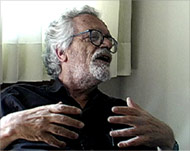Motorcycle Diaries blazes a trail
Early on a Saturday morning 60 twenty-somethings are standing outside a cinema – but they are not there to see a film.

They huddle excitedly waiting for a white-bearded, chain-smoking 71-year-old guru to teach his craft. Eduardo Coutinho is regarded by many as Brazil’s greatest living documentary maker in a country that has the eyes of the world focused on its talent.
Walter Salles’ travelogue of Che Guevara’s early life, The Motorcycle Diaries, wowed the critics in Cannes last month. It comes hot on the tracks of City of God, nominated for four awards at this year’s Oscars. Film is in fashion.
In between there was Carandiru, the biggest box office smash of all-time in Brazil, which opened worldwide in April. It is a film based on life at Sao Paulo’s biggest detention centre that culminated in the horrific police massacre of 111 inmates, as chronicled in a book by the prison doctor Drauzio Varella.
Director Hector Babenco, whose previous successes include Kiss of a Spiderwoman, says filming was difficult.
“The stress of making the movie was heavy, because we shot inside the walls of Carandiru which closed just a week before we began and had all the iconography of the particular universe of each prisoner drawn on the walls … the smell, the … like Dracula … you have all the energy, the density, the smell, the scent, the cucarachas, the rats, everything, ” he says.
Art and politics
But the cigar-chomping Babenco does not believe his film or City of God – which both showed global audiences extraordinary levels of violence endemic in Brazil – will be responsible for any political change.
“I don’t believe any gesture of art has a political responsibility. You can see my movie, you can read the paper, you can understand the music from the suburbs, but if this will be effective enough, it would be naïve of me to think so. I don’t believe in the responsibility of art to change the world. Never happened, never will happen,” he says.
But others beg to differ. There are films, like these, which are dramatisations of reality, and then there is reality.
 |
|
Michael Moore (R) had his latest |
Put the country, Brazil, together with the current hot genre, documentary (Michael Moore’s forthcoming Fahrenheit 911 was the first such winner of the Palme D’Or in 56 years) and you are looking at an explosion of talent.
Growth spurt
With foreign money pouring into the country in the wake of its successes and low exchange rate, more Brazilian documentaries were released between March and April than ever before.
Sixty new documentaries are in production or about to be launched.
The latest, Prisoners of the Iron Bars (Self-Portraits), is actually set inside Carandiru. The prisoners were given camcorders to record their own lives, from their homemade sugar cane rum factories and cannabis cultivation to the gross conditions they are forced to live in.
It could not be more timely. Thirty inmates were killed – half of them beheaded – in Brazil’s worst prison violence since Carandiru in Rio’s new Benfica jail last week.
Rio, too, is the setting for Bus 174, which launched in Europe in May.
Jose Padilha follows the hijacking and murder of passengers on a bus in the middle of the afternoon that was screened live for four hours on nationwide TV. He uses footage he shot of an infamous police massacre of street children in 1992 and makes the link with the hijacker as a survivor of that event.
 |
|
Eduardo Coutinho is seen as one |
Reasons
Film critic Ricardo Calil has down-to-earth reasons for the country’s recent successes.
“I don’t agree that Brazil is a special country for film talent, like it is with footballers. Like any place, it has good and bad.
“What’s happened recently is a considerable rise at the box office for Brazilian cinema, for a host of reasons, like the entrance of Globo [most prolific producer of TV programmes in the world] in marketing and launching films and the support of the major American distributors.
“In the specific case of documentaries, what is the reason for this boom in production? I think the explanation is simple; low and easy cost of production.
“Many financiers who can’t make fiction films are coming back to documentary, a situation which is re-enforced in the last few years by the use of digital equipment.
Global audience
“And what explains the good quality of some – not all – of the films? I think that with the appeal of the relative ease of production in this format some backers are more disposed to experiment and take risks from young directors like Paulo Sacramento (Prisoners of the Iron Bars (Self-Portraits)) to veterans like Eduardo Coutinho.”
More films bound to have big international audiences are on their way; Eternal Pele for one. It is to be released this month in Brazil featuring the life of the O Rei (The King), arguably the greatest footballer of all time, in a documentary by Anibal Massaini.
The current minister of culture, Gilberto Gil, is seen being arrested and sentenced to a term at a psychiatric clinic for possession of a small amount of cannabis in this month’s re-release of a 1976 film about a supergroup, Doces Barbaros, featuring Gil and Caetano Veloso.
Self-reflection
And then there’s the inevitable ultimate – a documentary about Brazilian filmmaking. A Film About Cinema, by Walter Carvalho, is in production and takes in the views of the new stars.
|
“In Brazil, people Eduardo Coutinho, documentary filmmaker |
And the old. Coutinho is about to release a film about Brazil’s latest movie poster boy – President Luiz Inacio Lula da Silva – with Joao Salles, Walter’s brother. It focuses on the working-class roots of the ex-strike leader.
“In Brazil, people are always waiting for messiahs,” says Coutinho. “The good thing is that Lula isn’t a classical populist who uses messianism.
He knows that he isn’t anything on his own. Something that Joao has noticed filming him is that Lula is incapable of being on his own.
“I imagined that I would meet a lot of people that would say: ‘No, I was a Workers’ party supporter, I took part in the strikes, but today Lula wears suits and drinks whisky.’ I thought I’d find a lot of this. I didn’t ask people about this specifically, but this resentment appeared very little, this feeling in relation to a metalworker going up in life … very little,” says Coutinho.
Inside the cinema, the audience is hanging on Coutinho’s every word. But this wise head exists outside the world of what’s in vogue.
“Be prepared to have another job because documentaries won’t make you any money,” he says.
“I had a kid I’d interviewed ring me up and ask me for some appearance money because he was poor. I explained that I’d only got back five per cent of the cost of the film and told him when I had any money I’d give him a call.”